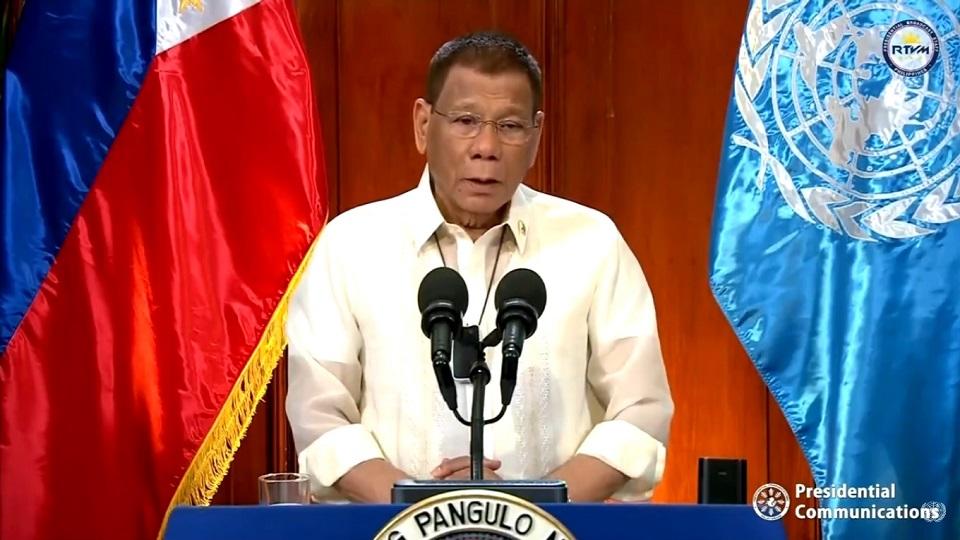Duterte invokes arbitral ruling vs. China in first UN speech

President Rodrigo Duterte on Wednesday invoked the country's arbitral victory in 2016 against China's massive claims in the South China Sea.
In his first speech before the United Nations General Assembly, Duterte said the Philippines rejected any attempt to undermine the July 2016 ruling of the Permanent Court of Arbitration in The Hague.
"The Award is now part of international law, beyond compromise and beyond the reach of passing governments to dilute, diminish or abandon. We firmly reject attempts to undermine it," Duterte said.
"We welcome the increasing number of states that have come in support of the award and what it stands for — the triumph of reason over rashness, of law over disorder, of amity over ambition. This – as it should - is the majesty of the law," he added.
France , Germany and the United Kingdom last week informed the UN of their rejection of China's "historic rights" in the South China Sea.
In a note verbale filed by the permanent mission of the UK before the UN in New Yourk, the European states referred to the arbitral ruling in 2016 which upheld the Philippines' claims based on the UN Convention on the Law of the Sea.
"France, Germany and the United Kingdom also highlight that claims with regard to the exercise of 'historic rights' over the South China Sea waters do not comply with international law and UNCLOS provisions and recall that the arbitral award in the Philippines v. China case dating to 12 July 2016 clearly confirms this point," the note verbale said.
The note was filed on Wednesday in New York (Thursday in Manila).
The UK mission asked the UN to circulate the note verbale "to all States Parties to UNCLOS and all Member States of the United Nations."
Duterte said geopolitical tensions continued to rise despite the COVID-19 pandemic.
He expressed the need for a de-escalation of tension as small countries would not be able to compete.
"Escalating tensions benefit no one. New flashpoints heighten fears and tend to tear peoples apart," Duterte said.
"When elephants fight, it is the grass that gets trampled flat," he added.
Duterte said one could "only imagine and be aghast at the terrible toll on human life and property that shall be inflicted if the 'word war' [deteriorated] into a real war of nuclear weapons and missiles."
"I therefore call on the stakeholders in the South China Sea, the Korean Peninsula, the Middle East and Africa: if we cannot be friends as yet, then in God’s name, let us not hate each other too much," Duterte said.
"I heard it once said, and I say it to myself in complete agreement," he added.
Landmark ruling
The Philippines in July 2016 won against China in a landmark ruling by an international tribunal that invalidated Beijing’s massive claims in South China Sea.
"The Tribunal concluded that there was no legal basis for China to claim historic rights to resources within the sea areas falling within the ‘nine-dash line’," the Permanent Court of Arbitration said then.
The 501-page ruling was handed down in The Hague, Netherlands, more than three years after the case was filed by the Philippines under the Aquino administration in January 2013.
Duterte early during his administration invoked an independent foreign policy that was supposedly less dependent on the US and more cordial toward China.
He said he wouldn't go to war with China over the claims in the West Philippine Sea because it would lead Filipinos to their deaths.
Over the course of his administration, he has repeatedly called China and Chinese President Xi Jinping friends of the Philippines.
The warmer ties didn't stop Chinese vessels from harassing Filipino fishermen in the West Philippine Sea.
Compliance in good faith
In July, the Philippines called on China to comply with the 2016 arbitral ruling, which invalidated its massive claim over the resource-rich South China Sea, four years since the decision was handed down by the international court in The Hague.
"Compliance in good faith with the award would be consistent with the obligations of the Philippines and China under international law, including UNCLOS (United Nations Convention on the Law of the Sea) to which both parties are signatories," Foreign Secretary Teodoro Locsin Jr. said in a statement.
As in 2016, China rejected the arbitral ruling and Locsin's call.
In a statement, Beijing's embassy in Manila said China did not accept or participate in the arbitration, nor did it accept or recognize the so-called award.
China insisted its "territorial sovereignty and maritime rights and interests in the South China Sea [would] under no circumstances be affected by this award."
"China firmly opposes and will never accept any claim or action based on aforesaid award," it said.
Instead of pushing for its compliance to the ruling, China said it hopes that the Philippines would preserve the "hard-won sound momentum of bilateral relations" and uphold peace and stability in the South China Sea." -NB, GMA News



